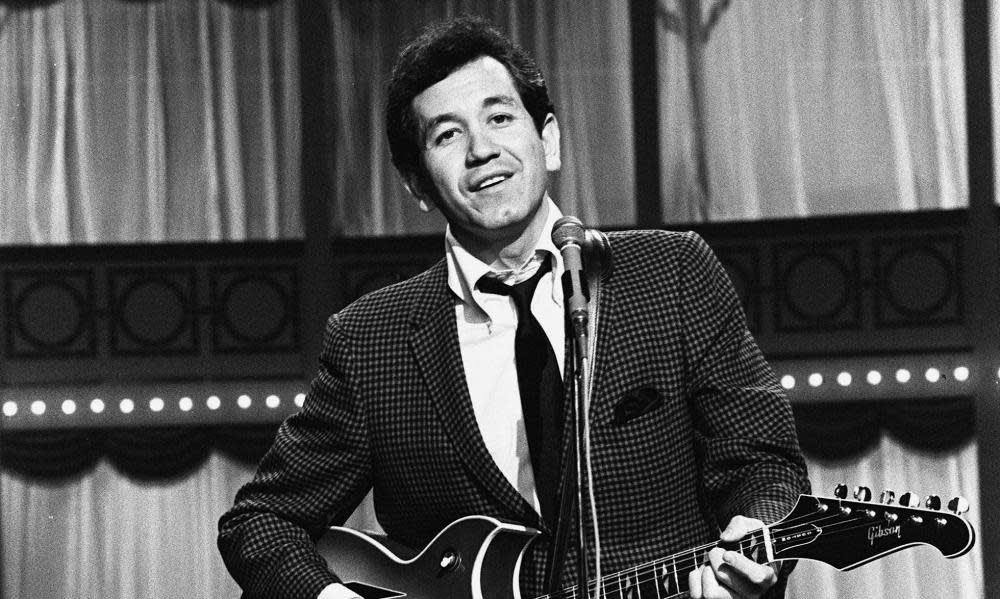Trini Lopez obituary

“From the barrio to Beverly Hills,” was how the American entertainer Trini Lopez liked to describe his life’s journey. Lopez, who has died aged 83 from Covid-19, achieved international success as a singer in the early 1960s and is best known in the UK for his 1963 hit If I Had a Hammer.
Lopez scored a dozen more US hit singles, including La Bamba (1966), which paid tribute to his Mexican roots. He was proud of his family’s origins, and his achievements opened doors for other Latino entertainers in the US. A versatile performer, he sang all manner of songs in his breezy manner on more than 60 albums: during the 1960s he regularly released three LPs a year.
He was popular across Europe – a superstar in Holland – and his 1967 live LP Trini Lopez in London saw him tackling songs made famous by Frank Sinatra and the Rolling Stones, among others. Sinatra had given Lopez his big break as a recording artist, and in 1965 got him a cameo alongside himself and Dean Martin in the film Marriage on the Rocks. Lopez was then cast as one of the leads in Robert Aldrich’s 1967 war film The Dirty Dozen. Sinatra – who disliked Aldrich – insisted Lopez should quit during filming, and although he remained in the finished movie, it was in a diminished role.
Lopez was born in Dallas, Texas, to Mexican immigrant parents, Trinidad Lopez II and Petra Gonzalez, who had entered the US illegally, poverty forcing them across the border. In Dallas they and their six children lived in a “barrio” made up almost entirely of Mexican migrants and known as Little Mexico. Lopez would later recall poverty and racism blighting his childhood. “You cannot imagine how hard it was,” he recalled. “I grew up in a very prejudiced part of the country. My father would take us to a little hamburger place – they wouldn’t serve us. Then, when we would get in a bus to go to school, they would tell us to sit in the back of the bus.”
His parents worked in the fields by day, his mother also taking in laundry while his father played music in bars. When Lopez was 11 his father spanked him for “hanging around with the wrong kind of kids”, but subsequently felt bad about it and purchased a $12 guitar for his son. Taught to play by his father, Lopez initially performed Mexican folk songs, busking and singing in Little Mexico bars. After leaving high school aged 16, determined to help support the family, he learned popular blues songs and began performing in Dallas bars and clubs, several of which were owned by Jack Ruby, the mob-connected impresario who would gain infamy by shooting Lee Harvey Oswald in 1963.
In 1957 Buddy Holly, then a rising Texan star, befriended Lopez and invited him to Clovis, New Mexico, where his producer Norman Petty had a recording studio. But, according to Lopez, Petty disliked Hispanics and contemptuously insisted his band play only instrumentals. Lopez returned to Dallas where, in 1958, Volk Records, a tiny local label, took him into the studio to record two songs he had written, The Right to Rock and I’m a Sinner Not a Saint. Volk then told Lopez they wanted to change his surname to Roper but relented when he threatened to walk out, and his debut 45 did well in the Dallas area. For King Records, a Cincinnati label, he recorded singles ranging from country ballads to doo-wop, but failed to score a hit.
After Holly’s death in a plane crash in 1959 his backing band, the Crickets, invited Lopez to join them in Los Angeles as vocalist. He found the Crickets more intent on partying than performing and, having promised his family he would send money, began singing in bars. Sinatra saw him perform at PJ’s, a Beverly Hills nightclub, and signed the Texan to his Reprise record label.
Sinatra and his producer Don Costa decided to use a live performance for his debut album, Trini Lopez at PJ’s (1963), which was a huge success. The album’s version of the folk standard If I Had a Hammer reached No 3 on the US charts and then became an international hit. Finally, after almost a decade’s hard work, Lopez was a star: by the end of that year he was reportedly earning $25,000 a week.
Rapid changes in popular music relegated Lopez to playing the “oldies” circuit while he was still in his 30s. Not that he complained – the casinos, cruise ships and international hotel dates proved extremely lucrative, and he continued to record. A disco LP Transformed By Time (1978) failed, but Legacy: My Texas Roots (2002) celebrated the songs that had inspired him. Into the Future (2011) proved Lopez still capable of strong interpretations of pop and rock standards, and in the same year the London label Ace Records gathered his 1950s-era recordings as Sinner Not a Saint. He released his first album of new tracks, All Original Songs, in 2016. That year he also wrote, with Joe Chavira, Coachella Valley Song, a celebration of Palm Springs, the Californian desert city to which he retired.
Lopez is survived by a brother and two sisters.
• Trinidad Lopez III, singer, born 13 May 1937; died 11 August 2020

 Yahoo News
Yahoo News 
